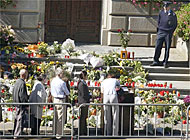
Delegates may step into Zug government next week

New representatives of Zug's cantonal government are expected to replace the victims of Thursday's massacre as early as next week.
The Zug cantonal government was plunged into crisis after it lost three of its members after a gunman opened fire during a session of the cantonal parliament. Eleven members of parliament were killed.
The three people belonging to Zug’s seven-member government were identified as Monika Hutter-Häfliger, health director for canton Zug; construction director Jean-Paul Flachsmann, and the head of the interior department, Peter Bossard.
Hanspeter Uster, the head of the cantonal government, and the education director, Walter Suter, have been hospitalised with serious injuries.
Official mourning
The Zug government is officially in mourning until the funeral of the victims, scheduled for Monday. New representatives are expected to be chosen in the days following the funeral.
All sessions of Zug’s government and parliament have been cancelled until the end of October. “The current circumstances mean that we are unable to maintain our assembly,” said Christiane Brunner, the president of Zug’s socialist party.
Authorities in Zug have published a book of condolences on the Internet, which gives everybody the opportunity to pay their respect to the deceased. Almost 400 entries have been made by Saturday lunchtime.
Handling urgent matters
In response to the crisis, Zug’s economic director and interim president, Robert Bisig, and the finance director, Ruth Schwerzmann, have set up a 13-member cantonal task force to deal with urgent cantonal affairs.
The new candidates will most likely be chosen from the runners-up list of Zug’s last cantonal elections in 1998.
They will automatically become members of the cantonal government after the remaining politicians grant their “tacit approval”, says Julian Hottinger, a political analyst and professor of political science at the University of Lausanne.
Bisig confirmed that three previous runners up had already been contacted for the new posts.
“This is quite exceptional for Switzerland, but it seems that in Zug it can be done as there is no constitutional rule on how the executive should be elected in a crisis, ” says Hottinger.
Returning to work
The priority will be that the government is able to function again as quickly as possible, he says. If necessary, members of other cantons and from the federal government can step in temporarily to help the Zug authorities get back to relative normality.
“Without doubt, Zug is going to be shaken for a while, and to a certain extent, members of government are bound to have some difficulty getting back to work,” says Hottinger. “But I believe that with time, things will settle down and they will be going back to work in a normal way.”
Hottinger says the main topics of discussion in future cantonal sessions both in Zug and elsewhere are likely to be security and the principle of “open democracy”.
“There will be a lot of debates around the issue of what happened and on whether the (cantonal) governments can continue functioning in an open mode, as they have done up till now,” Hottinger explains.
swissinfo

In compliance with the JTI standards
More: SWI swissinfo.ch certified by the Journalism Trust Initiative



























You can find an overview of ongoing debates with our journalists here . Please join us!
If you want to start a conversation about a topic raised in this article or want to report factual errors, email us at english@swissinfo.ch.